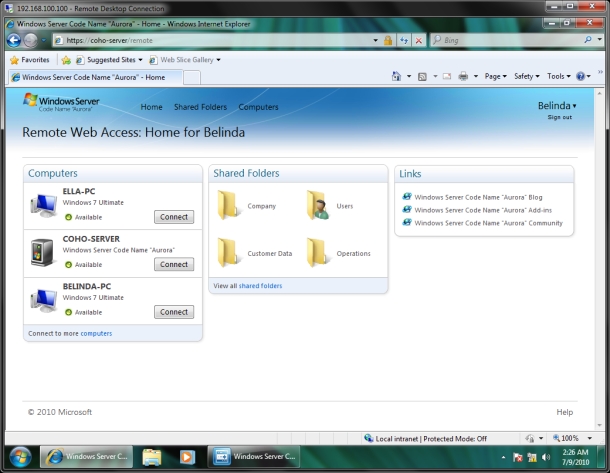Aurora opens Small Business Server to the cloud

Microsoft has released details of two upcoming editions of Windows Small Business Server, one an update of its current bundle and the other a new package targeted at very small offices and home businesses.
The products, which are scheduled for public beta release in August, were unveiled at the company's Worldwide Partner Conference in Washington, DC, on Monday. The update — code-named Small Business Server (SBS) 7 — is a straightforward revamp of its enterprise suite of Exchange Server, SharePoint and other server tools. The small office suite — code-named Aurora — is a new product that builds on the same Windows Server 2008 R2 core as the next release of Windows Home Server.

The Aurora homescreen. Screenshot: Simon Bisson
Aurora is aimed at businesses with five to 20 users and "ad-hoc IT budgets", Microsoft said. "It's a super-simple server for the very small business," Windows Server senior product manager Michael Leworthy said at a press briefing.
Aurora handles networking and file services locally with minimal management requirements, and it has tools for connecting to cloud-hosted services like email. Remote access tools give users access to files when on the road, as well as allowing IT staff to see if PCs have been backed up.
Like the upcoming Vail release of Windows Home Server, Aurora will use Microsoft's drive-pooling file system, which treats all the drives in a server as a single-storage fabric. Aurora will also support content duplication by default, with all files stored on multiple disks. Leworthy described it as "normalising all my drives, so I can add as many as I want, and it'll look and feel like one big drive". Users will be able to use external drives for backup and to extend the storage pool.
Aurora will use a simplified dashboard for all management tasks, with a Users view for handling all Active Directory operations. The same dashboard will also cover identity federation with cloud services from Microsoft and partners, and will display network health diagnostics for the server and for desktop PCs.
Microsoft believes that most users will work using Aurora's web-based self-service features on PCs using client software that automatically connects to the Active Directory. Leworthy noted the software also supports Macs, with the client software bundled for download from Aurora.
In addition, Microsoft is starting to integrate cloud services with on-premises hardware resource in the new server software. Leworthy described Aurora as a "cross-premises solution that not only has the things we know and love around SBS, but also with hybrid hooks into cloud services".
Those cloud services will be provided by Microsoft and third parties, using Aurora to manage user identities when connecting to services. Users will not need to manage passwords and accounts on their PCs, and they will be able to use any service that accepts federated Active Directory connections.
In contrast to Aurora, the SBS 7 update is meant for larger businesses with 75 users. Like the current SBS product line, it will come in Standard and Premium editions. However, it will not have the same drive-pooling or cloud service features as Aurora, instead continuing to use Microsoft standard NTFS file system and local applications, with Exchange 2010 for email and Windows SharePoint Foundation for collaboration.